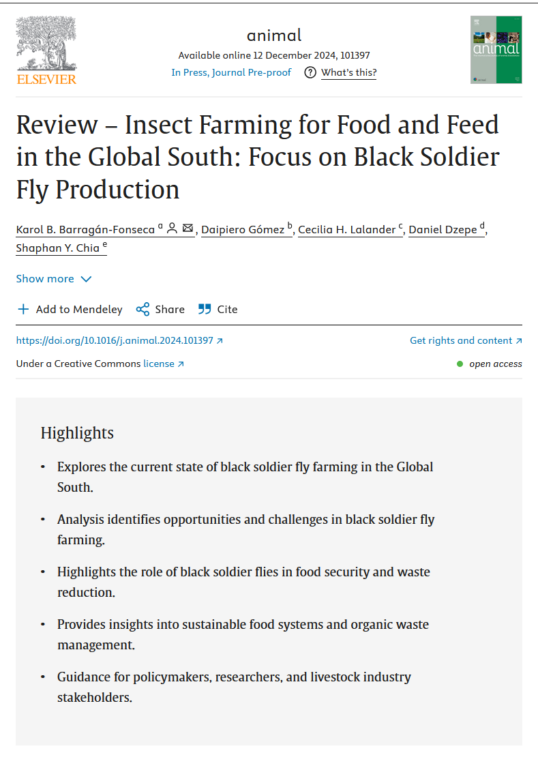
In this review, published in Animal, Karol B. Barragán-Fonseca, Daipiero Gómez, Daniel Dzepe, Shaphan Y. Chia and I (Cecilia Lalander) investigate the current state of black soldier fly larvae (BSFL) farming in the global south. We surveyed as many producers we managed, and were able to collect data from 33 of the 100 producers we contacted: 14 in Africa, 4 in Latin America, and 15 in Asia. The review highlights the potential of Black Soldier Fly (BSF) farming has in the Global South as a sustainable solution for food production and organic waste management. By converting waste into valuable products such as animal feed and organic fertilizer, BSF farming aligns with the principles of a circular economy and supports sustainable development goals. The study emphasizes the region’s strengths, including favorable climatic conditions that reduce resource inputs and a long tradition of entomophagy, which facilitates cultural acceptance of insect farming. Smallholder farmers play a vital role in this emerging sector, and BSF farming offers them economic opportunities, such as reducing feed costs for livestock and aquaculture.
Despite its promise, the sector faces significant challenges. Producers encounter regulatory gaps, making it difficult to ensure compliance and market their products. Securing a stable supply of high-quality waste substrates is another major hurdle, while scaling up operations is constrained by technological and financial barriers. These challenges are further exacerbated by competition from conventional feed sources such as fishmeal and soybean meal, which are frequently more cost-effective.
Regional variations also influence the development of BSF farming. For instance, African producers use diverse organic waste substrates, while Asian producers tend to avoid manure due to cultural resistance. Latin America, by contrast, has fewer established facilities and producers, likely due to lower familiarity with insect farming and less institutional support.
The review underscores the growing market demand for BSF products, especially for animal feed and pet food. However, to fully realize the potential of BSF farming, there is a need for global collaboration among policymakers, researchers, and the private sector. Efforts to establish consistent regulations, improve waste substrate logistics, and develop scalable technologies will be critical for overcoming these barriers. If you are interested, read the full review here.
